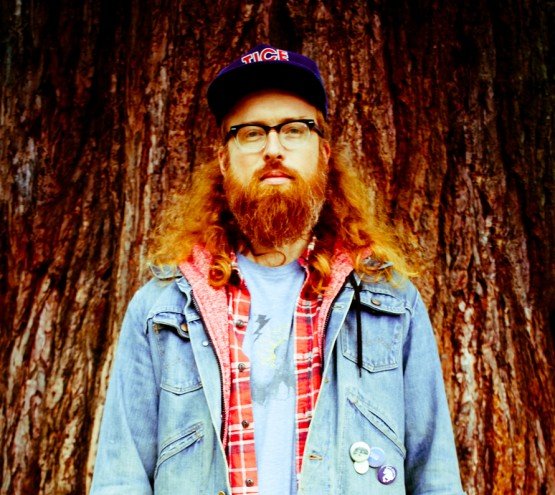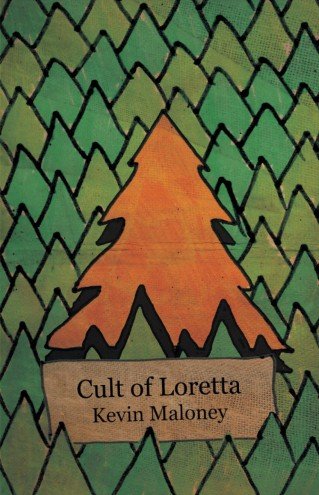Portland Writer Kevin Maloney


Reading Cult of Loretta during a red-eye flight from Newark to Portland was the best way I could have possibly spent my time crammed into that tiny seat. The fast pace, and musical rhythm kept me locked into each manically paced chapter. At first glance Kevin Maloney’s debut novel is the story about a garage band in the late ’90s and their unhealthy infatuation with the same woman, Loretta. But there is also so much philosophy threaded within the text. First, the song titles that Kevin came up with: “Sitting in a Bathtub with Jean-Paul Sartre” and “Which Way to Nowhere” show the author’s comedic, yet seriously existential bent. His main character, Nelson is kicked out of the band for screaming to the audience, “Tell me anything matters. Prove to me that anything matters!” instead of playing the guitar. Behavior similar to that of Elliott Smith when he played with Heatmiser in the mid to late ’90s. That drug fueled, dreary era in Portland is portrayed nicely by Kevin, and serves as the perfect backdrop for the characters’ hopelessness.
Cult of Loretta is essentially a coming of age story. Nelson is constantly searching for meaning while everyone around him is living dangerously. He thinks he finds his reason for living in Loretta, only to be let down by her free-spirited nature. He seeks enlightenment in drugs and goes down a rabbit hole of self-destruction. The “Cult” of Loretta is the group of friends who fall victim to the same fate, some worse than others.
I met up with Kevin Maloney at The Hilt on Alberta and we talked for an hour over beers. Being around the same age, I could relate to his story and told him that his book reminded me of college. He was extremely thoughtful and honest about his work, and shared some insights on the craft of fiction writing.
ELEVEN: Who is this Loretta? Is she real or an idea?
Kevin Maloney: On a personal level, she’s an amalgamation of three different women in my life. She’s a bit of my ex wife in there, there’s a bit of a long time friend of mine and former fiancee named Alison in there, and probably my first girlfriend back in high school. I don’t think the character of Loretta has much justice done to her in the book. She’s not much of a character, she’s an idea. In some ways I’d be interested in writing a story down the road about who Loretta actually is. Because how she comes across in this book… they worship her as if she’s not a real human being.
11: This book has a lot to do with being in a band in the ’90s in Portland. Can you tell me a bit about your musical experience?
KM: I grew up in the Beaverton/Aloha area and I was in a couple different bands, but we were playing in my buddy’s garage but were never good enough to play at La Luna. That’s where we’d go on a Friday or Saturday night in ’94-’95 and at the time we felt kind of gypped because Seattle had Nirvana and Pearl Jam and we had a handful of bands that were available to us, and one of those bands was Heatmiser with Elliot Smith.
11:There’s that scene with Loretta watching Elliot Smith’s appearance on the Grammys while strung out in that trailer and thinking it was the most beautiful thing she had ever seen. Why is he so significant?
KM: Part of the reason I put him as a focal point in this book, and not because he was really responsible for it, but his career really coincided with him blowing up and eventually moving to New York, and Portland really started to change after he left. But he came out of the real gritty Portland that I remember. Maybe writing the book for me was reconnecting with not only the part of Portland I was a part of, but also the part that I missed. I had a lot of friends that stayed, and some of them went down a darker road. Back then Portland was much more of a heroin-y kind of place. Some of my friends got into not so much the heroin, but the synthetics.
11:So what exactly is “screw?”
KM: The main drug in there, screw is made up in part because my experience with drugs were psychedelics and smoking pot. I didn’t want to appear to speak in first person about some of the drugs that people I knew got into so I just made it up to give me a little artistic license to describe kind of a drug that gave you both the lows of heroin and the highs of LSD or mushrooms. I didn’t want to try to write about an experience that I hadn’t had. Having read Basketball Diaries about a first person account of someone going through heroin addiction–I didn’t have the experience to write that book. So I just had a little fun with it and made a drug up.
11: How long did it take you to write this?
KM: I had written a few short stories and was flirting with the idea of putting together a short story collection, but then three of the stories popped out at me as having kind of similar themes. Then just when I was tweaking those stories a little bit something just clicked. I mean, from start to the end of the first draft was eleven days. Something happens when you’re in that special mindset when things are just coming out of you and you’re just trying to keep up with it.
11: What is your process? Is it kind of that “write what you know” thing?
KM: I have a hard time writing the truth. I’m still friends with those people and I don’t want to hurt anybody, or try to misrepresent them. But when you can draw from life and dump it into fictional characters, nobody is going to say “That’s me.” They will probably remember where that is from. Also I like reading books where people make really shitty decisions. So what I think I can do in my books is to take those events in my own life where I thought maybe this is a really bad idea, and where I would have gone home, my character makes the bad decision.
11: There’s definitely some philosophy in this book. Was this intentional or did it just kind of fall in place?
KM: Yeah I definitely was trying to go for a philosophical theme. Nelson trying to figure out the meaning of life while driving his best friend’s ashes around. Trying to figure out right from wrong while everybody is doing drugs and having random sex dovetailed nicely with Elliott Smith’s Either/Or album, which I was listening to while writing the book, which was named after the book by Kierkegaard. I was really into existentialism when I was eighteen. That’s a big part of why it’s there.
11: What about Nelson carrying around a copy of Thus Spoke Zarathustra? Does that have anything to do with the repetitive behavior of the main characters?
KM: Maybe? I can’t remember if Nietzsche goes into the myth of the eternal return in that one, but I know Camus wrote the Myth of Sisyphus about pushing the boulder up the hill only to have it come rolling down. Loretta definitely plays that kind of role for the young men in the book. »
– Scott McHale



